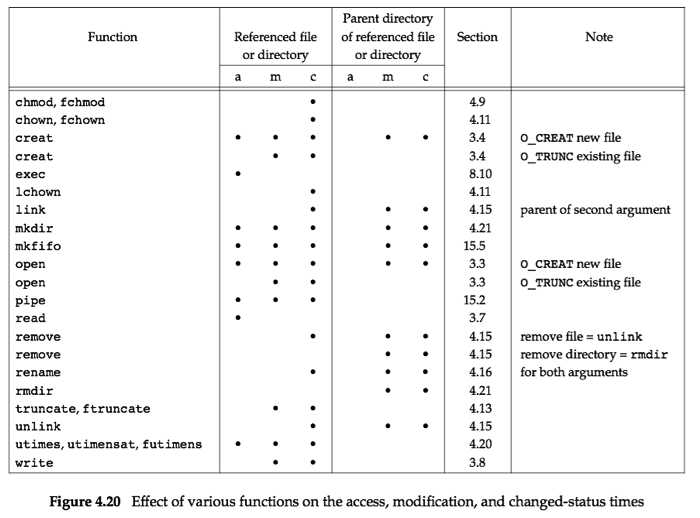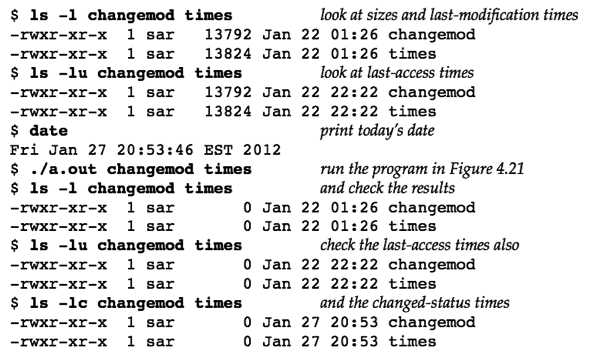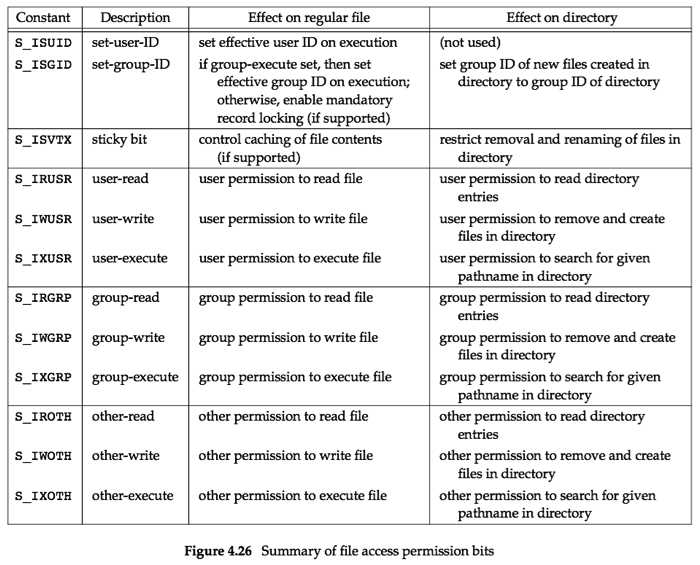标签:
?1 File Times
每个文件会维护三个时间字段,每个字段代表的时间都不同。如下表所示:

字段说明:
i-node中的信息和文件的实际内容是分离的,所以当更新i-node时,需要更新的时st_ctim(the changed-status time),而不是st_mtim(the modification time)。
命令ls各个参数排序时使用的时间标准:
下表总结了会影响这三种时间的部分函数,在看到表之前,我们需要了解:
?
函数作用:修改文件的access time和modification time。
函数声明:
#include <sys/stat.h>
int futimens(int fd, const struct timespec times[2]);
int utimensat(int fd ,const char *path, const struct timespec times[2], int flag);
参数说明:
strcut timespec结构体中至少包含两个时间字段:time_t tv_sec(秒)和long tv_nsec(毫微秒)。
数组times包含两个时间:第一个元素是access time,第二个元素是modification time。
函数行为受参数times的取值影响,需要参考时可以自行查询。
?
同时,执行上面的一对函数也会对权限有要求,要求如下:
函数细节:
函数utimes通过制定一个文件路径pathname,来修改文件的相关时间。
函数声明:
#include <sys/time.h>
int utimes(const char *pathname, const struct timeval times[2]);
strcut timeval {
? ? time_t tv_sec;
? ? long tv_usec;
};
我们不能指定修改时间字段st_ctim(changed-status time),但是在调用utimes函数时,该字段被自动更新。
Example:
?例子情景:
Code:
#include "apue.h"
#include <fcntl.h>
?
int
main(int argc, char *argv[])
{
? ? int ? ? ? ? ? ? i, fd;
? ? struct stat ? ? statbuf;
? ? struct timespec times[2];
?
? ? for (i = 1; i < argc; i++) {
? ? ? ? if (stat(argv[i], &statbuf) < 0) {? /* fetch current times */
? ? ? ? ? ? err_ret("%s: stat error", argv[i]);
? ? ? ? ? ? continue;
? ? ? ? }
? ? ? ? if ((fd = open(argv[i], O_RDWR | O_TRUNC)) < 0) { /* truncate */
? ? ? ? ? ? err_ret("%s: open error", argv[i]);
? ? ? ? ? ? continue;
? ? ? ? }
? ? ? ? times[0] = statbuf.st_atim;
? ? ? ? times[1] = statbuf.st_mtim;
? ? ? ? if (futimens(fd, times) < 0)? ? ? ? /* reset times */
? ? ? ? ? ? err_ret("%s: futimens error", argv[i]);
? ? ? ? ? ??continue;
? ? ? ? }
? ? ? ? times[0] = statbuf.st_atim;
? ? ? ? times[1] = statbuf.st_mtim;
? ? ? ? if (futimens(fd, times) < 0)? ? ? ? /* reset times */
? ? ? ? ? ? err_ret("%s: futimens error", argv[i]);
? ? ? ? close(fd);
? ? }
? ? exit(0);
}
运行结果:(由于我用的mac os不支持的原因,并没有编译成功该例,所以直接用书上的结果)

从结果中可以看到,last-modification time和last-access time没有改变,而changed-status time发生了改变。
?
mkdir和mkdirat函数创建一个新的空的目录,rmdir函数用来删除目录。
函数声明:
#include <sys/stat.h>
int mkdir(const char* pathname, mode_t mode);
int mkdirat(int fd, const char* pathname, mode_t mode);
参数mode取值为基于在前面一篇提到过的文件创建掩码(file creation mask of process)。
?rmdir函数用来删除一个空的目录,空目录中只含有两个记录(dot和dot-dot)。
函数声明:
#include <sys/stat.h>
int rmdir(const char* pathname);
上面的三个函数,调用成功返回0,失败返回-1.
?
对于目录文件,只要有相应的权限,任何人都可以读取目录文件的内容。但是为了保证系统正常工作,只有内核可以对目录文件执行写操作。
在前面的章节中,我们了解到,目录文件的写权限位和执行权限位决定了我们是否可以在该目录下创建和删除文件,但是它们并不能允许我们写目录文件本身。
读文件操作依赖于系统实现。相关函数声明如下:
#include <dirent.h>
DIR *opendir(const char* pathname);
DIR *fdopendir(int fd); ? // return : pointer if OK, NULL on error
struct dirent *readdir(DIR *dp); ? ?// return : pointer if OK, at end of directory or error
void rewinddir(DIR *dp);
int closed(DIR *dp); ? ?// return : 0 if OK, -1 on error
long telluride(DIR *dp); ? ?// return : current location in directory associated with dp
void seekdir(DIR *dp, long loc);
细节说明:
?
每个进程都有一个工作目录(current working directory),工作目录是进程的一个属性。
函数声明:
#include <unistd.h>
int chdir(const char* pathname);
int fchdir(int fd);
?比较简单,不做赘述。
如果我们希望获取当前工作目录的完整信息(绝对路径),无法直接从内核获取,因为内核只是维护了一个指向该目录的指针。
如果我们要获取绝对路径,需要通过dot-dot进入上级目录,读取该级目录的信息,获取目录名,然后再依次访问上级目录一直到根目录,最后拼出绝对路径。
函数getcwd就是实现了这个功能。
函数声明:
#include <unistd.h>
char* getcwd(char *buf, size_t size);
需要注意的一点是,这里的buf需要足够大,size为它的大小。buf需要容纳绝对路径加上一个字节的null终止符。
?Example:
函数功能:修改当前工作目录(chdir)并获取该工作目录绝对路径(getcwd)
Code:
#include "apue.h"
?
int
main(void)
{
? ? char? ? *ptr;
? ? size_t? ? ? size;
?
? ? if (chdir("/usr/") < 0)
? ? ? ? err_sys("chdir failed");
?
? ? ptr = path_alloc(&size);? ? /* our own function */
? ? if (getcwd(ptr, size) == NULL)
? ? ? ? err_sys("getcwd failed");
?
? ? printf("cwd = %s\n", ptr);
? ? exit(0);
}
切换工作目录到/usr/并打印工作目录。
?
如下表所示

??
这一章包括了三篇内容,主要围绕stat函数,了解了:
下一章我们将会学习标准IO库。?
?
参考资料:
《Advanced Programming in the UNIX Envinronment 3rd》
?
UNIX高级环境编程(5)Files And Directories - 文件相关时间,目录文件相关操作
标签:
原文地址:http://www.cnblogs.com/suzhou/p/4303077.html